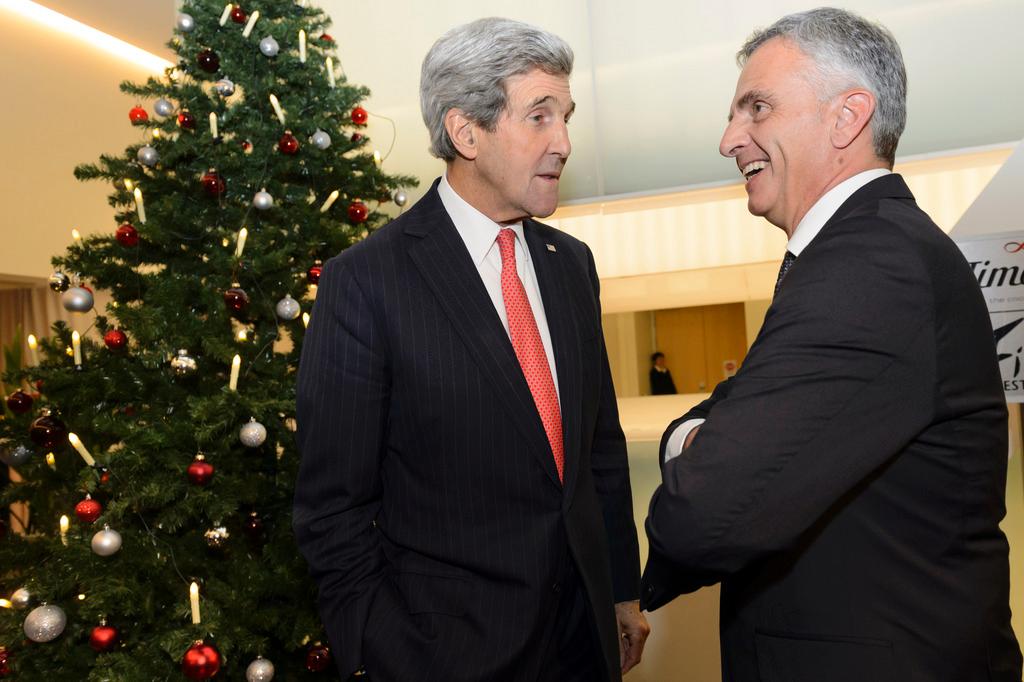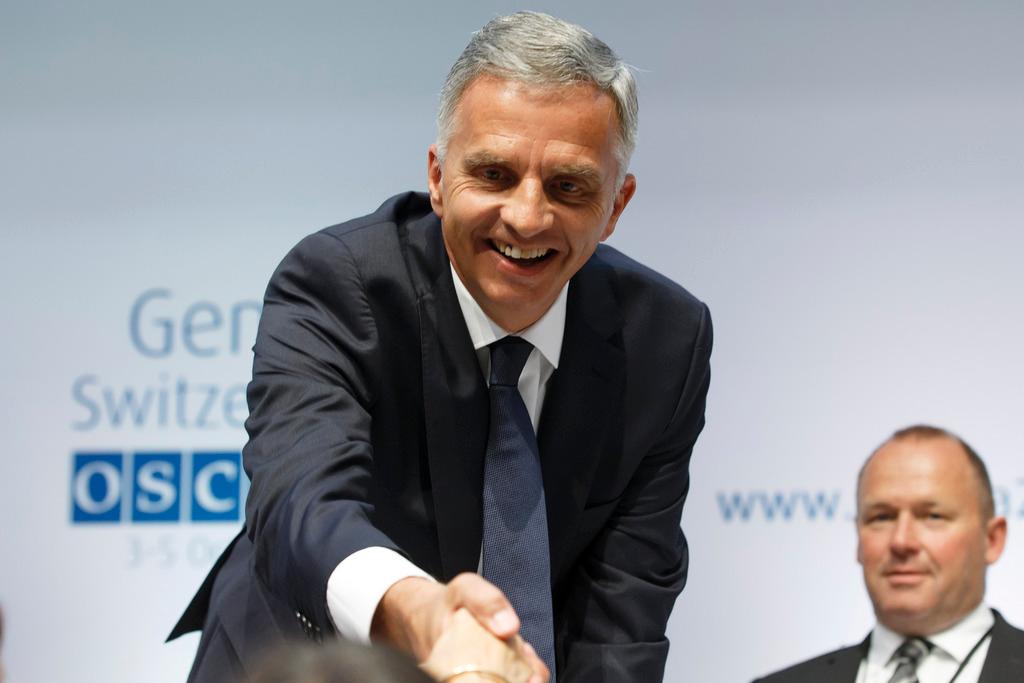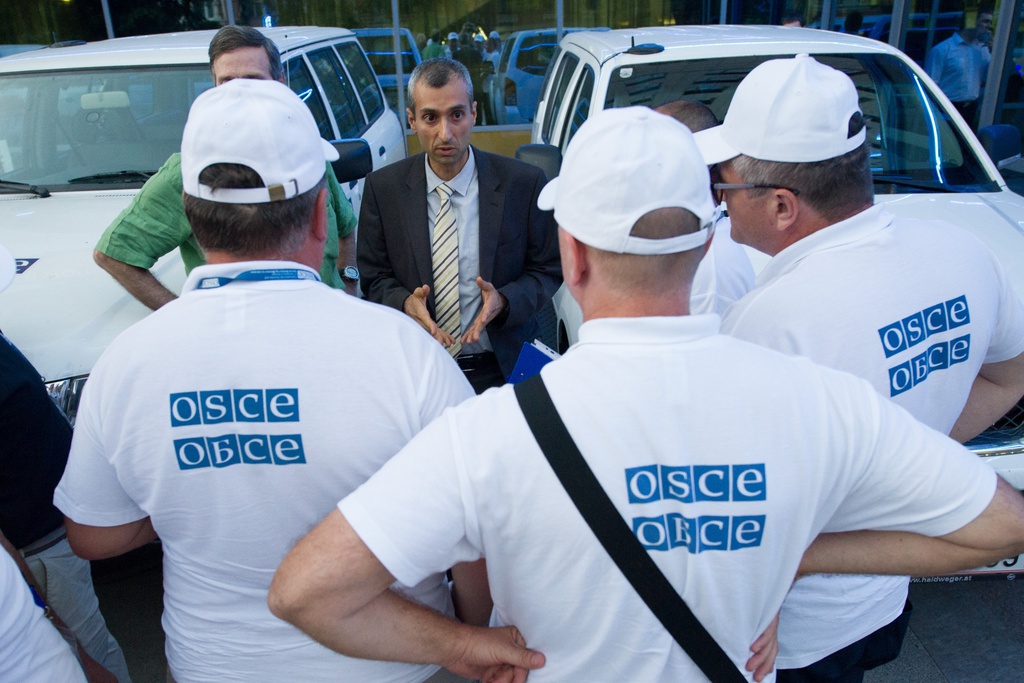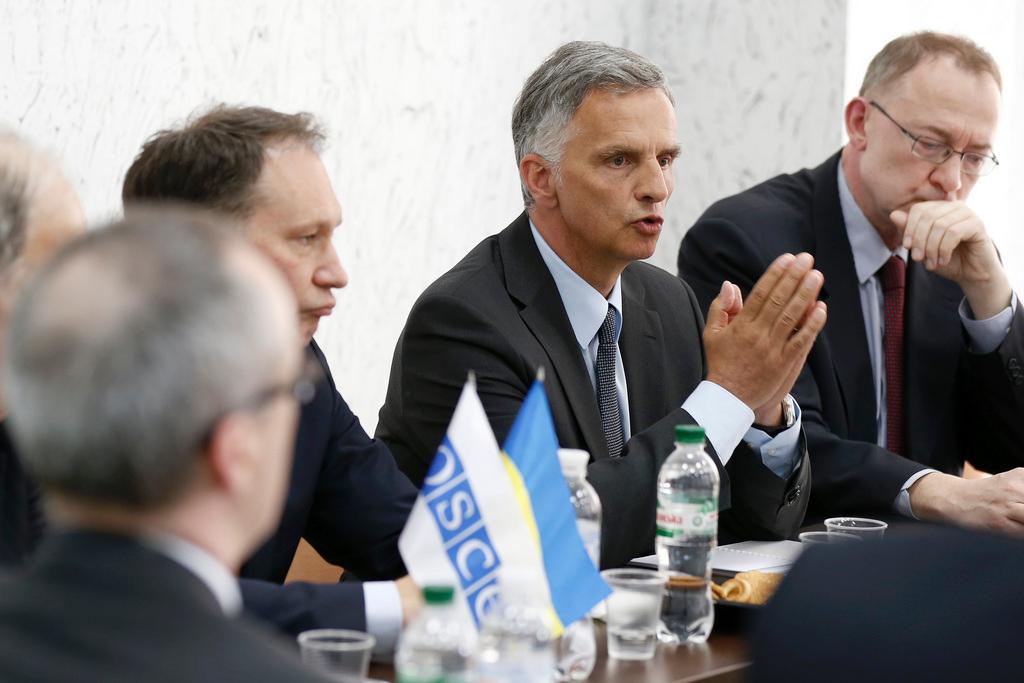Burkhalter denounces ‘aggressive rhetoric’ over Ukraine

Swiss Foreign Minister Didier Burkhalter has criticised a “dangerous increase in military activities” and “aggressive rhetoric” within the context of the crisis in Ukraine.
Addressing a meeting of foreign ministers from the Organization for Security and Cooperation (OSCE) in Basel, Burkhalter acknowledged that it hadn’t been a normal year for the OSCE and that despite wide-ranging efforts, including by Switzerland, the situation in Ukraine was “anything but satisfactory”.
Nevertheless, he said the fact that so many ministers had travelled to Basel showed that the OSCE was necessary as a platform.
The first day of the ministerial council was dominated by the situation in Ukraine and discussions on security in Europe.
Burkhalter called for efforts to improve implementation of the de-escalation measures in Ukraine and to step up support for the OSCE special monitoring mission and the Trilateral Contact Group (senior representatives from Ukraine, Russia and the head of the OSCE).
He pointed out that the Ukraine crisis also had ramifications for security in Europe and that it was not only the people in Ukraine who had been put under considerable strain.
He also said that the trust between Russian and the West had suffered and that many of the standard post-Cold War assumptions on European order had been called into question.
Nonetheless, “the OSCE demonstrated its capacity to agree on and implement concrete measures to de-escalate the crisis in Ukraine”.
As examples, Burkhalter named the special monitoring mission and OSCE-supported ceasefire agreement. “In order to ensure the positive role played by the OSCE, all the players involved would need to summon the political will, despite their differences, to maintain cooperation and work together to find a solution,” he said.
Additional funds
In view of the developments taking place in Ukraine, Burkhalter called for every effort to be made in implementing the Minsk agreement consistently and efficiently.
He stated that the Trilateral Contact Group must be supported and that the special monitoring mission must be granted the funds it requires and be given the necessary freedom to carry out its tasks safely.
To this end, Burkhalter announced Switzerland had allocated an additional CHF2 million ($2.05 million) to support the OSCE monitoring mission. He also declared Switzerland’s willingness to back all political dialogue within Ukraine and to support a variety of civil society projects.
With reference to security in Europe, Burkhalter announced the appointment of a panel of experts from the whole OSCE area tasked with drawing up recommendations on how to re-establish trust and uphold security in Europe as a common undertaking once again, describing the aim of the panel as “not about bringing about revolutionary change in the European security landscape, but about re-establishing a greater degree of security for each individual”.
‘Turbulent waters’
Also speaking in Basel on Thursday, US Secretary of State John Kerry said Russia had pitched itself into isolation through its own actions in Ukraine and could rebuild international credibility only by ending its support for pro-Russian separatists.
However, Russian President Vladimir Putin, giving his annual state of the union address in Moscow, described Russia as surrounded by enemies who sought its destruction.
Kerry said Moscow had failed to live up to its commitments under September’s Minsk ceasefire accords to end the conflict in Ukraine. “The United States and countries that support Ukraine’s sovereignty and rights do not seek confrontation,” he said.
“It is not our design or desire that we see a Russia that is isolated through its own actions. In fact we are convinced that Moscow could rebuild trust and relationships if it simply helps to calm turbulent waters, if it takes steps now to implement the Minsk Protocol,” he added.
For his part, Putin said Russia was justified in intervening in Ukraine because the West had supported a “coup” in Kiev. He said the war that followed in the southeast, in which heavily armed pro-Russian separatists seized a region they now call “New Russia”, had proved Moscow’s policy was right.
In a private half-hour meeting later on Thursday, Kerry and Russian Foreign Minister Sergey Lavrov spoke briefly about the situation in Ukraine, and Kerry urged Lavrov to have Moscow “return to serious discussions” for a cease-fire, a senior State Department official who sat in on the discussion told reporters.
Russia denies Western accusations that it has supplied arms and troops to back the pro-Russian rebellion.

In compliance with the JTI standards
More: SWI swissinfo.ch certified by the Journalism Trust Initiative



You can find an overview of ongoing debates with our journalists here. Please join us!
If you want to start a conversation about a topic raised in this article or want to report factual errors, email us at english@swissinfo.ch.